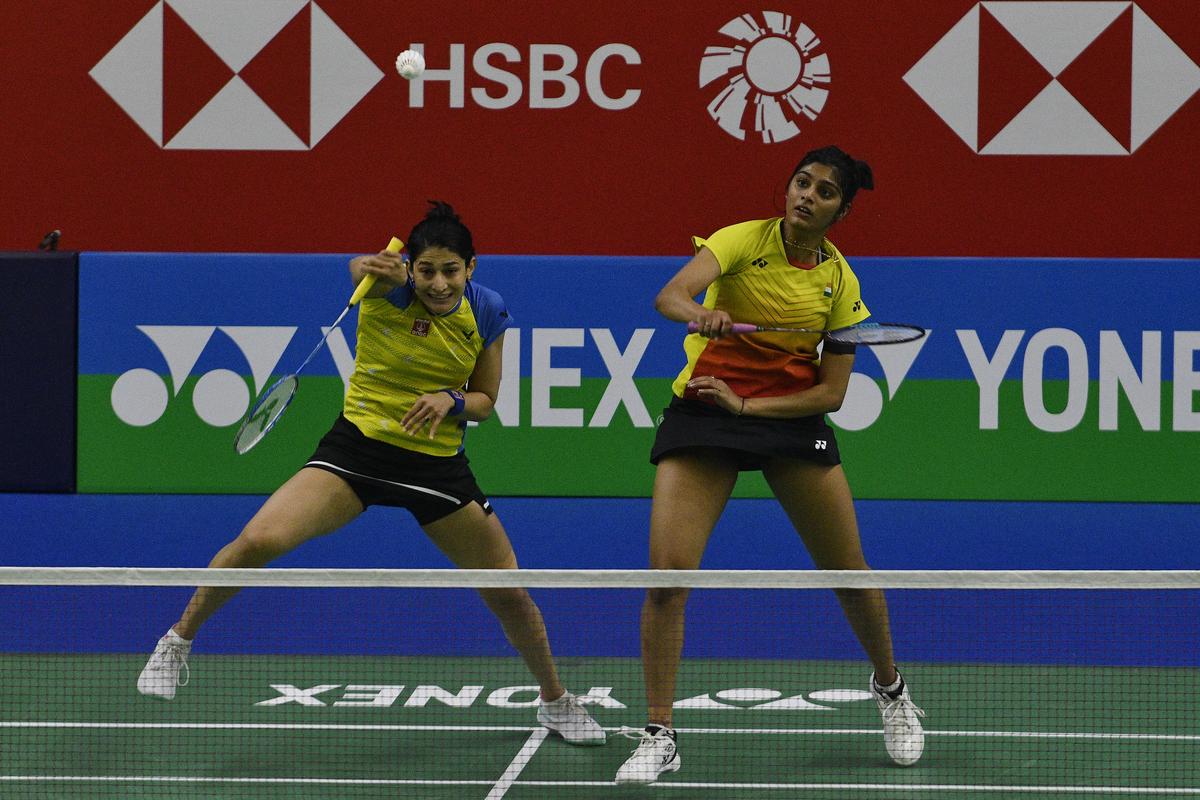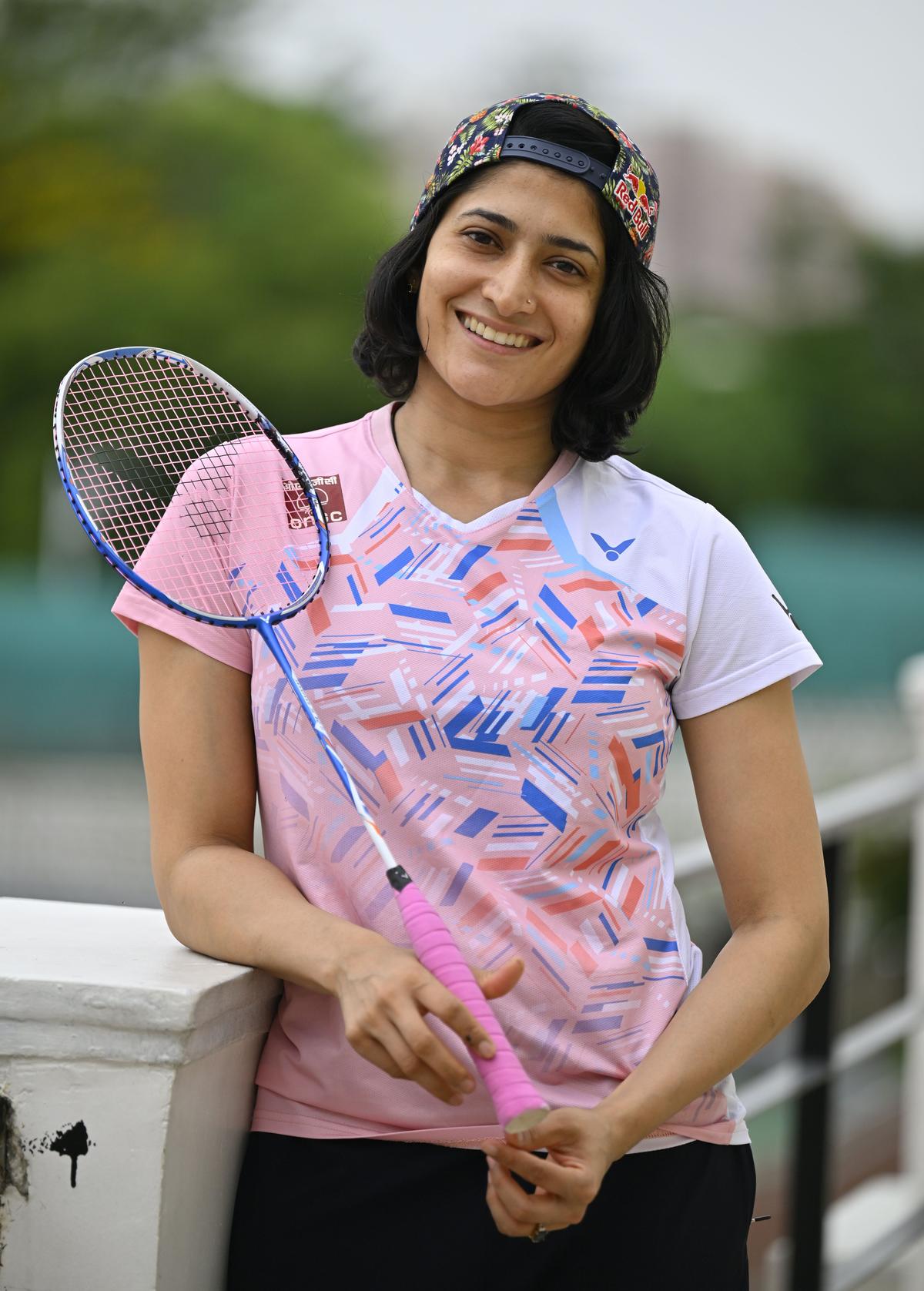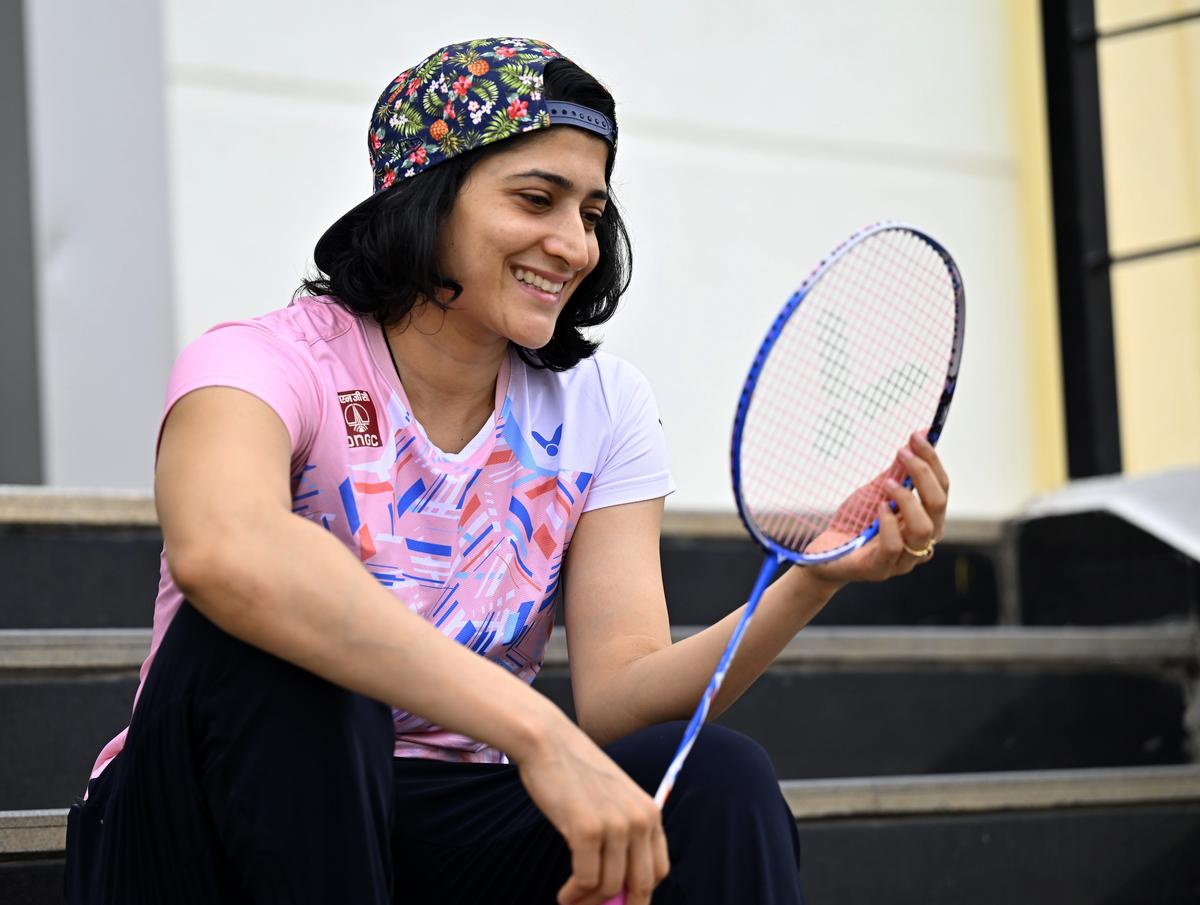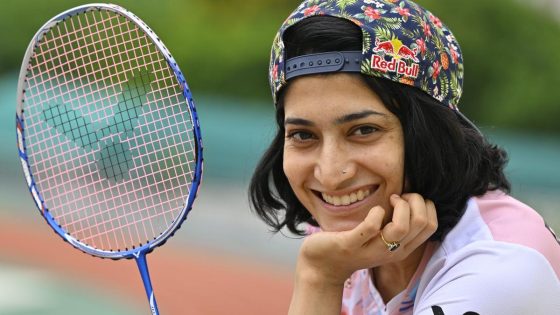On a rather cloudy Saturday afternoon at the Pullela Gopichand Badminton Academy, we waited in the reception area to interview Ashwini Ponnappa — India’s veteran shuttler and a key player to watch at the marquee event of the Paris Olympics. It was a busy day at this iconic academy in Hyderabad, with players practising on the courts, admin staff working, and many people passing by the couch we were sitting on.
CLICK HERE FOR ALL THE PARIS 2024 UPDATES
A woman in a piggy pink tee approached and greeted us in a modest and unassuming manner. One half of Crasto-Ponnappa, India’s doubles prospect in badminton, Ashwini, sat down for a chat with Sportstar and talked about her early days, attaining glory, and the pressures of the Olympics.
Do you remember the first time you picked up a racquet?
Well, the first time I picked up a badminton racket was at home where I lived, playing outside with my friends. Those are my initial memories of playing the sport. Even though my dad was a hockey player, my mom and dad thought that badminton might suit me. There was a court right next to where my dad worked, so it worked out for my parents because both of them worked, so one could drop me off and pick me up from practice. That’s how badminton started.
At what age did you start playing, and when did you realise you could pursue badminton professionally?
I started training when I was eight and a half. I began competing when I was nine years old, but it was after I won my first national title in the sub-junior category in girls doubles that I felt badminton was something I could pursue. At that point, we were selected for the junior Indian team and as probables for the Commonwealth Games, so I thought, “Okay, badminton is something I can pursue.”
Do you remember receiving your first medal?
I remember the first badminton award I got was at the RBI quarters where I lived when I was young. We had a community hall there that was set up as a badminton court, where they held a family tournament for all the employees and their families. That’s where I won my first badminton tournament, or badminton gold, you could say.
You started your doubles journey with Jwala Gutta, and you had a considerable age gap with her. Now you are partnered with Tanisha, who is 21. Do you think life has come full circle?

Ready for the big stage: Paris 2024 will be the first Olympics for Ashwini and Tanisha as a doubles pair.
| Photo Credit:
SHIV KUMAR PUSHPAKAR
Ready for the big stage: Paris 2024 will be the first Olympics for Ashwini and Tanisha as a doubles pair.
| Photo Credit:
SHIV KUMAR PUSHPAKAR
If you look at it like that, yes. When I started out, I was very young and inexperienced when I played with Jwala, but with Tanisha, it’s a bit different. Even though she is very young, and we have a very huge age gap, she is also playing mixed doubles.
By the time I started partnering with her, she was already a part of the Indian team and had represented the country in two major tournaments. She was playing international mixed doubles, so she wasn’t new to the senior international scene. Age-wise, she is young and has a long way to go; I think that’s the only similarity between how we started our careers.
You decided over lunch to play together. Tell us a bit about that.
The run-up to lunch was important too. Of course, I had taken a break from doubles for a couple of months. Before I took the break, the coaches had suggested I play with Tanisha.
I had a couple of players in mind, but I really needed a break to think about whether I wanted to continue playing doubles and how I wanted my career to go.
The break helped because it gave me a lot of clarity. By the time we went for lunch, both Tanisha and I knew that the coaches were rooting for our partnership. The important thing was that both of us wanted to play together. That lunch cemented our decision to give this partnership a shot.
How is it playing with Tanisha? What are the things you tell her?
I enjoy her excitement. Even I am excited about going with Tanisha, and this is our first Olympics as a pair. The important thing I would tell her is to enjoy the experience. It’s about having that balance of being in the zone during our matches and switching off [when not playing]. There will be a lot of pressure and focus on the event, so it’s important to keep our heads on our shoulders, remember what our goal is, and learn to relax along the way, especially during the day when we are not having our matches.
Are you looking forward to playing a certain pair in Paris?
Not really. If the pair you want doesn’t come, then what? It’s better not to have expectations about whom we want to play. Whoever comes or whichever group we are in, we will be gunning to go and play well. So, no favourite pair as such.

Ashwini Ponnappa.
| Photo Credit:
NAGARA GOPAL
Ashwini Ponnappa.
| Photo Credit:
NAGARA GOPAL
How are you feeling physically and mentally?
I am quite happy with the fact that we have a couple of weeks before we head for the Olympics. It gives us a good training block with our coaches, Gopi sir and Arun Vishnu, and my strength coach, Deckline. These aspects are pretty important. Otherwise, you’re playing so many tournaments that you don’t get a long training period. It’s nice to have it this time.
Mentally, I’m taking it one day at a time, focussing on improving every day, and giving my best on the court. I’m working on adding that tiny percentage to our game that can help us do well.
Take us through your day. What does it look like weeks before the Olympics?
I can’t predict the future, but I can describe the last couple of weeks of our training. We’ve had 6 o’clock sessions where we’re on the court from 6 to about 7:30-8. We have a break in between and then start again at 10:30 and go until about 12. In the evening, I go to the gym from 3 to 4, or sometimes 4 to 5.
Some days, I also do skill work, so it could be 3 to 4 of gym and then skill work for an hour. Wednesday and Saturday afternoons are off, so we have rest days, and of course, Sunday is a full day off.
What are your thoughts on India’s chances at the Olympics?
I think our chances are pretty good. We have many players who are in the world’s top rankings in their respective sports. However, at an event like the Olympics, the pressure is very different. The player who deals with the pressure best has a strong advantage. I hope all our players, including us, can cope with the pressure and do well.
How do you deal with the pressure of social media?
Sometimes I look at social media and regret it. Sometimes it can put a lot of pressure on me and plant unnecessary thoughts in my head. We are humans at the end of the day. We do have emotions and react to things people say online. So, at times, I don’t look at the comments. I mean, it’s scary even to post. Unlike in the past, people are much more judgmental these days.
Initially, social media was more about enjoying what we posted, but now everything is questioned, you know. If you post something good, you’re not focused; if you post something bad, again, it’s an issue. You don’t know what to post.
I prefer staying away from it, but I understand there are well-wishers who sincerely want us to do well, and it’s only for them that I make an effort to post every now and then.

Ashwini Ponnappa..
| Photo Credit:
NAGARA GOPAL
Ashwini Ponnappa..
| Photo Credit:
NAGARA GOPAL
How has the support from your friends and family been?
It’s been great. One of the reasons I have continued to play is thanks to my family. They’ve been my biggest supporters — my husband, parents and brother.
My friends have also been big supporters and motivators over the past couple of years. They’re the ones who keep me going when the going gets really tough. It’s them who’ve always been in my corner, irrespective of how I play or what I do.
You came really close at the 2012 Olympics. What are the lessons you will take from there?
The biggest lesson I’d take from 2012 is to not leave anything to chance. I remember that we won two of the four matches, but we still didn’t qualify. In 2012, women’s doubles was very controversial. If that controversy hadn’t occurred, we would have reached the quarterfinal stage. It was quite unfortunate. Every single match and every single point is very important, and that’s what I will take going forward.
Do you switch off from the game?
It’s very important to switch off because otherwise, there is a lot of stress and pressure, which will definitely affect your game and body. It’s important to come back, relax, go out, and explore the village. Seeing how things are and interacting with other athletes are things that have helped me in the past.
What are your thoughts on sponsorships?
I think, compared to a lot of other sports, badminton has sponsors who come forward. It’s all about comparison. Badminton is fairly good, but the difference lies in who gets what. Some players get a lot, while some hardly get anything.
A lot of sponsors do see badminton as a good opportunity for visibility because it is quite popular in India and is growing. Many matches are being aired on TV. It’s about who gets what and how the sponsorship is distributed.
An advice you’d like to give young girls playing badminton.
Work really hard and give it your best shot. There is no guarantee of making it, especially in sports, but you must give it your best shot and see how far you can go.
Source Agencies



